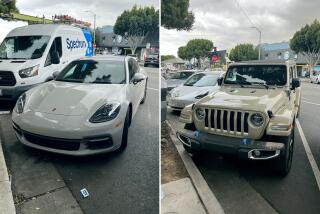Van Nuys Firm Cashes In on Israeli Invention : Folding Car Shades Are a Red-Hot Item in Sun Belt
- Share via
Those folding cardboard car shades that sprouted under a few windshields here and there last summer are getting to be as common as cassette players nowadays, and not just in Southern California.
The shades have been hotter than a sizzling steering wheel all over the Sun Belt this summer. So many companies are now in the business--an estimated 40 nationwide--that sales figures are uncertain, but industry sources estimate that 12 million will be sold by the end of the year.
“Hot cakes,” pronounced Joe Reynosa, manager of a Pep Boys store in Simi Valley. “Right now, I got ‘em on sale for $1.99. I sell 800 a week on sale, and 200 a week at $3.95.”
More Elaborate Designs
All the competition among distributors has suppressed wholesale prices and led producers to pursue the lucrative specialty market in shades that bear corporate logos or advertising messages.
Companies ranging from BankAmerica to Coca-Cola have already had shades made up with corporate logos on them, and producers are also trying to lure consumers with designs more elaborate than a big pair of sunglasses.
For all the competition, though, the car shade business remains dominated by Van Nuys entrepreneurs Avi Fattal and Avi Ruimi, two young Israeli immigrants who popularized the accordion-like cardboard sun blockers after borrowing the idea (without permission) from its Israeli inventor, 58-year-old entrepreneur Abraham Levy.
Levy, who says 1 million of the devices have been sold in Israel since the mid-1970s, is busily pursuing unauthorized knock-offs in the courts; his brother Avner, an American management consultant who helps with the business, said about 20 infringers have been sued already, with several cases still pending.
Meanwhile, Fattal and Ruimi have grown rich selling the product. Fattal just bought a flaming red Porsche, Ruimi got a bright white Mercedes, and Fattal’s wife, Jenny, is quitting her job to write screenplays.
Their company, Auto-Shade Inc. in Van Nuys, now claims 80 employees and predicts that sales this year will reach $12 million, up from $3 million last year. Fattal said his firm already has sold 6 million shades this year and expects to sell another 2 million by year-end, mostly for about $1.60 each. The shades generally retail for up to $5.
Auto-Shade also has outgrown its 20,000-square-foot headquarters and is looking for a building three times as big, said Fattal, who turned 30 years old in April and whose partner will do likewise this fall. Both share the title of president.
Credited for Success
Perhaps most important, Auto-Shade has resolved its legal troubles with inventor Abraham Levy, who obtained a U.S. patent on the device in 1980. He sued Auto-Shade for patent infringement last year, and Fattal and Ruimi settled by agreeing to pay undisclosed royalties.
The lawsuit notwithstanding, the Levy brothers acknowledge that before Fattal and Ruimi came along they had had little success in the United States with the car shades, and Abraham Levy’s invention might never have caught on here without them.
Auto-Shade is foremost among five or 10 big distributors who now dominate the business, and there are perhaps another 30 competitors. Not all pay royalties, and Abraham Levy, an affable Israeli war veteran with a passion for literature, vows to pursue every last one in court.
The impact of all these players is manifest in the marketplace. Michael Manor, who heads the Chief Auto Parts unit of Southland Corp., said Auto-Shade was the only supplier when Chief first started selling the screens last year, but now he has many more potential sources.
Lynda Goldman is a case in point. She started selling Arizona Car Cooler shades with a desert motif in February to make money between free-lance writing assignments and soon found herself with a booming business.
She won’t discuss sales, since she’s still negotiating a royalty agreement, but she admits that she got the idea while in Israel, where Levy’s car shades have been popular for years. She said business is so good in Arizona that her Phoenix firm, L&M; Enterprises, has come out with a Miami Visor featuring palm trees and flamingoes.
Fattal says he isn’t worried about the competition, but he does get upset at newcomers like Goldman who aren’t paying royalties or licensing fees--his own unauthorized beginnings notwithstanding.
But after stories in such publications as Time and Forbes and on television news, which featured them, Fattal and Ruimi haven’t had to share much glory for the product’s success.
“I have to give them credit,” said Avner Levy. “They’ve done a superb job.”
Perhaps too superb. Fattal said the popularity of car shades and the frenzied competition among distributors has cut his profit margins and made it difficult to get enough of the product from Los Angeles corrugators.
Nevertheless, Auto-Shade’s volume has increased dramatically, and now it sells throughout North America, South America and Japan, Fattal said.
“They’re all over,” said Paula Stevens, a Phoenix librarian. “I happened to be at the carwash and picked one up.”
Karol Gordon, assistant customer service manager at Merchandising Innovations in Hanover, Pa., said her firm has sold 175,000 car shades since March in Florida and Georgia. Merchandising Innovations is a unit of Tim-Bar Corp., also in Hanover, which owns several large corrugating plants. Gordon said Tim-Bar not only makes shades in vibrant colors and designs but uses moisture-resistant glue to withstand Southern humidity.
The popularity of car shades has opened up new opportunities. The shades stand up under windshields, and besides protecting dashboards, steering wheels and seats, they offer a mini-billboard that moves all over town.
10 Million in Use
“Today, as I see it, we’re selling advertising space,” said Fattal.
He said Auto-Shade already has produced shades for Coke, Pepsi, Honda, Goodyear, BankAmerica, Budget Rent-a-Car, Nissan and NBC, which used them to advertise weatherman Fritz Coleman.
Firm figures are scarce, but Fattal estimates that there are 10 million cardboard car shares in use. Craig Vickers, vice president of Car Shades Inc. in Arcadia, said his count of the number in existence, including unsold shades, is closer to 20 million.
Distributors say there is still lots of room for growth. According to R. L. Polk & Co., which collects automotive statistics, there were 114.7 million cars registered in the United States as of July 1, 1985, the latest figure available.
Abraham Levy, who also has patented a self-adjusting transmission, says the idea for an automotive sun-blocker came to him around 1970 as he was supervising a construction site and had to park under the hot sun.
At first, he tried covering the windshield of his parked car with a polystyrene board, but that got dirty and didn’t fold. So he experimented with all sorts of materials and configurations until finally he settled on the cardboard folding device.
Car shades aren’t a new idea. Vickers said he searched the patent history of products designed to keep the sun out of parked cars and turned up about 40, the first of which was patented on Feb. 27, 1912.
He said later tries have included sun-blockers that stand on folding legs, roll-down shades for side windows and suction-cup devices that still are available.
The 1912 patent was issued to Frank H. Ilse of Chicago, according to a Patent Office spokesman, who said it was for a contraption with curtains that shaded early autos from the sun.






